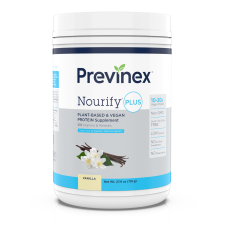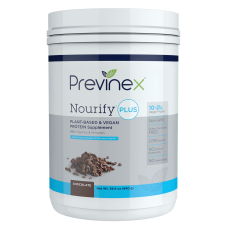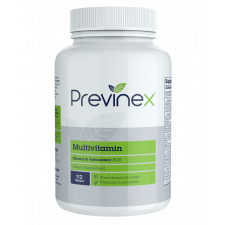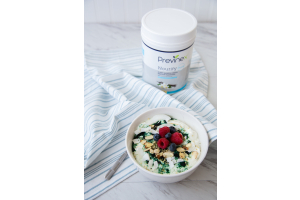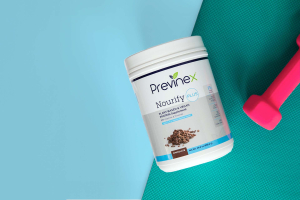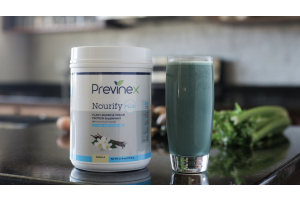
It’s the age old question in the nutrition world, ‘Do I need supplements, or can I get all of the vitamins, minerals, and antioxidants my body needs by just eating healthier?’
We’re going to help you finally get the answer!
When it comes to your health, there are some basic and powerful ways to optimize it. At Previnex, we see Optimal Health as a five pronged approach, where proper food consumption and maintaining a healthy weight is the foundation. Next to food, the other pillars are supplementation, exercise, sleep, and stress management.
Given how confusing and controversial the topic of supplements can be, we’d like to cover the basics on supplementation and offer what we hope is compelling data to firmly answer the question, “Should I be taking nutritional supplements?”
“I Get Everything I Need From My Diet”
This is a common response when discussing supplements, as you would think a healthy diet alone should provide everything to optimize your health. But, it is virtually impossible to get the breadth and levels of nutrients that are required for optimal health from diet alone. To illustrate this point by focusing on one letter vitamin and antioxidant, vitamin E, the current data shows that 400 international units (IU) of vitamin E provides optimal health benefits. To get that amount of vitamin E from food, one would need to eat 28.8 pounds of spinach per day or 2.3 pounds of almonds. It’s not practical or possible, and this is the data on just one letter vitamin (no breadth).
RDAs vs. Optimal Nutrition
The Recommended Daily Allowances (RDAs) were developed and first introduced during World War II to protect soldiers from deficiency diseases like scurvy, rickets, and pellagra. These diseases are highly uncommon in developed countries like the United States, but our entire food labeling system is based on the RDA approach. The underlying suggestion is that if you’re getting 100% of the RDAs or Daily Value (DV) of various nutrients, you’re protecting your health by getting all that is required.
Nutritional science has rapidly evolved over the past 10 years, and at this point, the breadth of data is both compelling and crystal clear that the body requires far greater levels of nutrients than those outlined in the RDAs for optimal health. This partially has to do with the declining quality of our environment (air pollution, soil degradation and nutrient depletion, greater environmental toxins and stresses like pesticides and radiation, over-processed food supply, etc.).
Why Are Nutrients So Important?
Nutrients are rich in a broad spectrum of vitamins, minerals, and antioxidants, and if you’ve ever wondered why you’ve been told your entire life to “eat your fruits and vegetables,” it’s because of the breadth of antioxidants and other cofactors that exist in fruits and vegetables. Antioxidants are literally ANTI-oxidation and nature’s answer to oxidation is ANTIoxidants.
The medical literature tells us that eating five to six servings of fruits and vegetable daily can reduce one’s risk for degenerative diseases like heart disease, cancer, and osteoporosis. It also tells us that over 70 long-term degenerative diseases come via chronic oxidation.
The Importance of Antioxidants
To understand antioxidants, we need to first talk about free radicals. Free radicals are unpaired atoms or molecules that are missing an electron. They are highly unstable and scavenge your body in search of an electron to stabilize. Left unpaired, free radicals can cause damage to parts of cells such as proteins, DNA, and cell membranes by stealing their electrons. This process is known as oxidation.
Free radical-generating substances are found in the food we eat, the drugs and medication that we take, the water we drink, and the air we breathe. These substances include fried foods (via hydrogenated oils), alcohol, tobacco smoke, pesticides, air pollutants, and many more.
Antioxidants, which are known as “free radical scavengers,” lend an electron to free radicals and neutralize them before they oxidize, which protects the underlying cell structures. This is why fruits and vegetables, and the breadth of nutrients that are found in them, are so important. But this is also why getting the breadth and levels of nutrients that the studies show provide optimal health benefits is even more important (optimal protection from free radical and oxidative damage).
The Science
In 2002, Harvard researchers conducted a 38-year study that concluded, “Insufficient vitamin intake is apparently a cause of chronic diseases…such as cardiovascular disease, cancer, and osteoporosis.” They went on to state, “Given the modern diet, supplementation with a multiple vitamin is a prudent, preventative measure against chronic disease.” (JAMA;2002;287:3127-3129).
The earlier explanation of free radicals, oxidation, and antioxidants should help shed some light on this study and conclusion, but sadly, since the study’s publication date over a decade ago, nutritional deficiencies continue to be on the rise across the country. While there are many reasons for this, the outcome is the same – your risk factors for chronic degenerative diseases goes up when you have a nutritional deficiency.
According to a more recent study published in the Journal of Nutrition, a substantial portion of the population consistently fails to adequately intake key nutrients. Coming to the same conclusion as most of the research that has preceded it, the study concludes, “Without enrichment and/or fortification and supplementation, many Americans (do) not achieve the recommended micronutrient intake levels set forth in the Dietary Reference Intake.”
The Bottom Line
The bottom line is this – most people are not getting enough vitamins, minerals and antioxidants from their diet alone, and this could have major long-term health consequences if not addressed. In a busy world where basic nutrition is often overlooked in favor of the convenience of processed, pre-made, fast food options, is it any surprise that most people aren’t getting adequate nutrition? Eating a well-balanced diet that includes fruits and vegetables is a great place to start, but as stated, it is virtually impossible to get the breadth and levels of key nutrients that your body requires for optimal health from your diet alone. An effective and inexpensive way to fill many known nutrient gaps is through nutritional supplements. Supplementation is a proactive solution and inexpensive insurance policy that can easily fit into any lifestyle.

